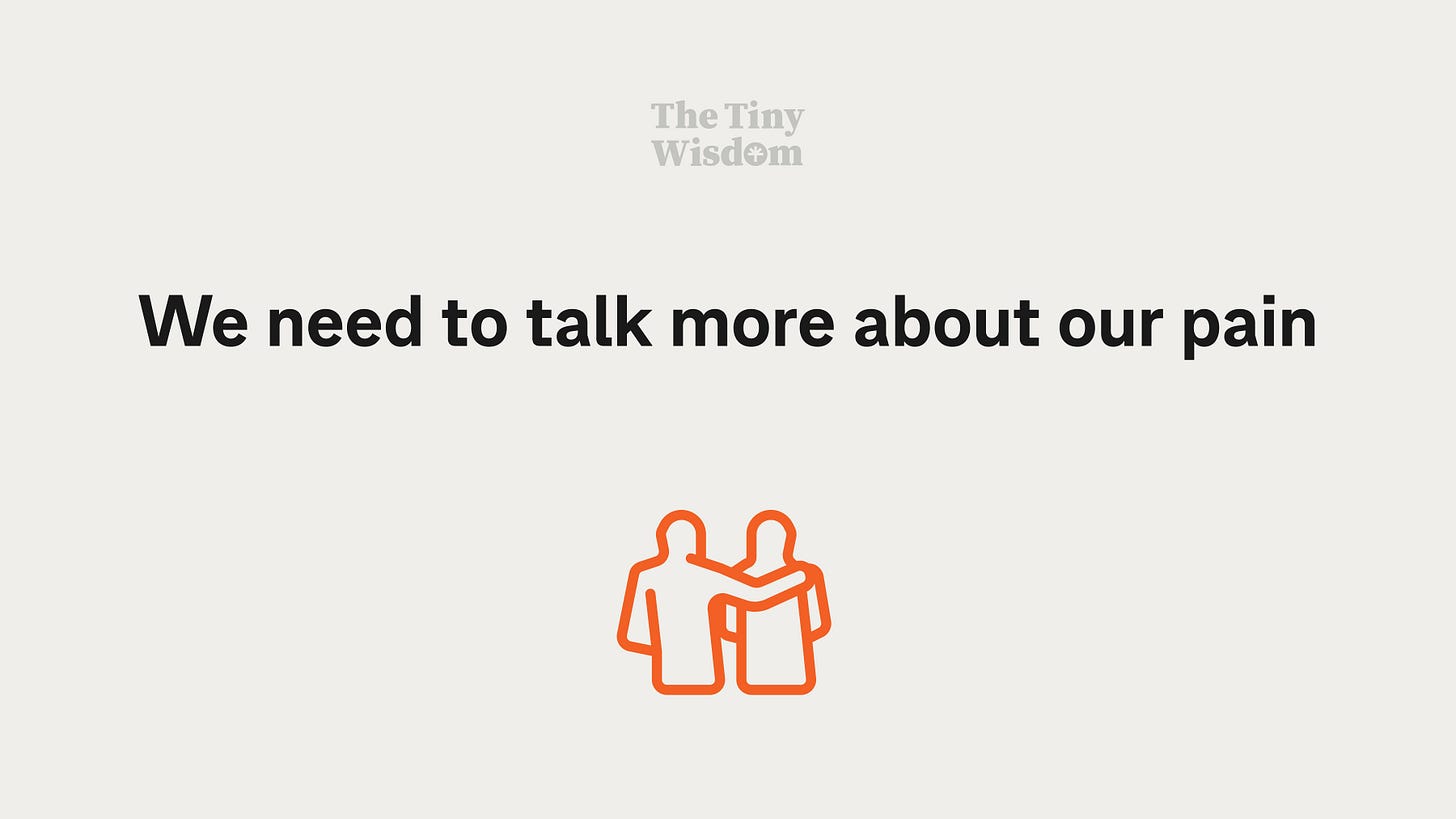We need to talk more about our pain
I've been thinking a lot about silence lately—not the peaceful kind that brings tranquillity and zen, but the heavy kind that isolates.
The kind where words get stuck in your throat because you're afraid of being judged or, worse, being a burden.
We live in a society that celebrates strength and resilience but often misunderstands what those qualities actually look like. True strength isn't about carrying everything alone until you break. It's about knowing when to reach out, when to say, "I'm struggling," and when to let others in.
As we age, we learn one hard truth about being human: we're not supposed to complain, or so we're told.
That's why most of us keep our struggles to ourselves:
Our loneliness
Our stress at work
Our pressure to provide
Our fear of not living up to expectations
Because who wants to hear someone complain? Aren't we supposed to be strong? Aren't we supposed to be reliable? Aren't we supposed to have it all together?
So we develop coping mechanisms. Some of us sit in our cars for a while before going inside. Some of us linger in front of a convenience store. Some of us drown ourselves in work. Some of us take long walks. Some of us pray.
We do this because we think nobody will understand, because we don't want to burden anyone, because we believe we should stay strong, and because we think we shouldn't complain.
The cost of silence
But what's the price we pay for this silence? Research consistently shows that suppressing emotions doesn't make them disappear–it intensifies them. When we bottle things up, we're not solving problems; we're creating pressure cookers within ourselves.
I've seen it happen too many times: people who appear to "have it all together" suddenly fall apart, relationships end because needs aren't expressed, and health deteriorates because stress is internalised rather than addressed.
We tell ourselves it will be all right if we just keep it inside. Even if nobody knows that deep down, we're hurting.
The truth is, pain doesn't diminish when hidden. It grows in the dark, feeds on isolation, and convinces us we're alone when we're anything but.
Breaking the cycle
What would happen if we started normalising conversations about our struggles? If instead of "I'm fine," we sometimes said, "Actually, I'm having a hard time"?
I'm not suggesting we dump our problems on everyone we meet. There's a time and place for vulnerability. But creating spaces where honesty is welcomed rather than judged could transform not just individual lives but entire communities.
Maybe it's time we changed that story. Maybe it's time we checked in on the people around a friend, a sibling, a parent, or a colleague.
We're all carrying something. And sometimes, all it takes is one person to ask, to listen, to care.
How to connect with people
Here's what I've been practising lately:
Ask better questions. Instead of "How are you?" (which almost always gets an automatic "fine"), I try "What's been on your mind lately?" or "What's challenging you these days?" And obviously, be prepared for a "deep" talk. When people open up, it's not going to be small talk.
Creating safe spaces. When someone shares, I try to listen without immediately jumping to solutions. Sometimes, they just need to be heard. They just need someone to vent to.
Going first. Being appropriately vulnerable about my own struggles often gives others permission to do the same.
Checking in consistently. A single "how are you really doing?" text can be the lifeline someone needs on a difficult day.
The paradox of shared Pain
Here's something I've discovered that still amazes me: When we share our pain, it often doesn't multiply the pain; it lessens it. When we voice our fears, they frequently lose their power. When we connect with people, or with ourselves, we find strength we didn't know was possible.
This isn't just a feel-good philosophy. Studies on social connection consistently show that authentic relationships are among the strongest predictors of well-being and resilience.
It's okay to talk. It's okay to feel. It's okay to lean on a shoulder. Because life is too hard to go through alone.
Today, I invite you to take one small step toward a more honest connection. Text that friend you've been thinking about. Answer truthfully when someone asks how you're doing. Create a moment where pain doesn't have to hide.
Because in talking about our pain, we don't just find relief. We find each other.
I hope you find this insightful. Remember:
It's not going to be easy,
But it's not impossible.
Your friend,
Brian.



